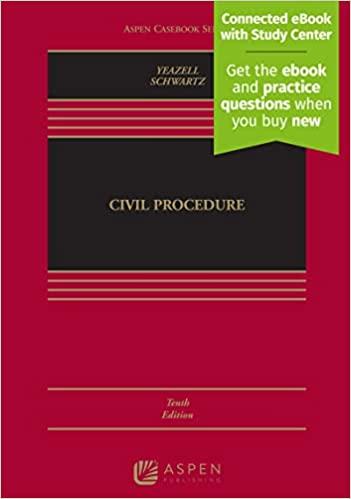Question
Question 1(Mandatory)(20 points) Match the ethical norm to its best descriptive phrase: Question 1 options: Match them with there numbers below. Justice Freedom Stability Efficiency
Question 1(Mandatory)(20 points)
Match the ethical norm to its best descriptive phrase:
Question 1 options: Match them with there numbers below.
Justice
Freedom
Stability
Efficiency
1.Employer hires whom it chooses.
2.Business' reputation and good will
3.Who is responsible
4.Recognizing liability and taking appropriate measures
Question 2(Mandatory)(5 points)
U.S. Const. art. VI, clause 2, is referred to as the:
Question 2 options:
Supremacy Clause because it provides for the U.S. Supreme Court.
Commerce Clause because it provides for federal control of interstate transport of goods.
Paradox Doctrine because it contradicts state law.
Supremacy Clause because it provides that the Constitution, the federal laws and treaties made pursuant to the Constitution are the supreme law of the land.
Question 3(Mandatory)(5 points)
CHOOSE ALL THAT APPLY. Which of the following refer to criminal law?
Select 2 correct answer(s)
Question 3 options:
Capital punishment
Felony
Eminent domain
Utilitarianism
Question 4(Mandatory)(5 points)
A case in which only the judge hears the evidence and decides the case is called a _________.
Question 4 options:
justice conference
bench trial
jury trial
mediation
Question 5(Mandatory)(5 points)
Which of the following is a true statement?
Question 5 options:
Arbitration is always conducted by a panel of hearing officers.
A corporation is a legal person.
The notice requiring a defendant to appear in court or have a judgment entered against him or her is called a writ of appearance.
Private law involves the relationship of government to individuals.
Question 6(Mandatory)(5 points)
Milton Friedman was an economist associated with which of the following theories?
Question 6 options:
Free Market Ethics
Deontology
Aristotelian Virtue Ethics
Stakeholder Theory
Question 7(Mandatory)(5 points)
Which of the following is NOT a classification of TORTS?
Question 7 options:
Strict liability
Negligence
Criminal misdemeanors
Intentional acts
Question 8(Mandatory)(5 points)
"Tort" is the French equivalent of the English word for ______.
Question 8 options:
Cake
Duty
Wrong
Justice
Question 9(Mandatory)(20 points)
Match the following theories to their best descriptive statements:
Question 9 options: Match the words with their numbers below
Deontology
Social Contract
Virtue Ethics
Utilitarianism
1.Cost benefit analysis for finding the best possible results and providing the greatest good to society as a whole.
2.Having a moral intent and following the right rules form a better path to ethical conduct than achieving the right results.
3.Various communities, as well as nations, make rules for the common good; example: U.S. Constitution.
4.Emphasizes core values and intrinsic honorable qualities.
Question 10(Mandatory)(5 points)
Nuisance is a type of tort that relates to:
Question 10 options:
Injury to the person (physical)
Injury to reputation
Injury to property
Injury to wages
Question 11(Mandatory)(5 points)
In a speech at the Lions Club, Y. Politician falsely states that X. Citizen is a pedophile and should be run out of town. If X. Citizen sues Y. Politician for making this statement, which of the following is his cause of action?
Question 11 options:
Defamation/slander
Nuisance
Defamation/libel
Trespass to reputation
Question 12(Mandatory)(5 points)
Which of the following is NOT an element of the tort of intentional interference with contractual relations?
Question 12 options:
There was a contract between the plaintiff and a third party.
Defendant received a benefit from the contract
Defendant knew of the contract.
There was injury to the plaintiff.
Defendant improperly induced the third party to breach the contract or made performance of the contract impossible.
Question 13(Mandatory)(5 points)
In torts, proximate cause is:
Question 13 options:
negligence
foreseeable and not too remote
an intervening event
causation in fact
Question 14(Mandatory)(5 points)
The doctrine wherein an employer is responsible for the negligence of his employees if they were acting in the scope of employment is called ___________________.
Question 14 options:
strict liability
Bad Luck Doctrine
vicarious liability
proximate cause
Step by Step Solution
There are 3 Steps involved in it
Step: 1

Get Instant Access to Expert-Tailored Solutions
See step-by-step solutions with expert insights and AI powered tools for academic success
Step: 2

Step: 3

Ace Your Homework with AI
Get the answers you need in no time with our AI-driven, step-by-step assistance
Get Started


